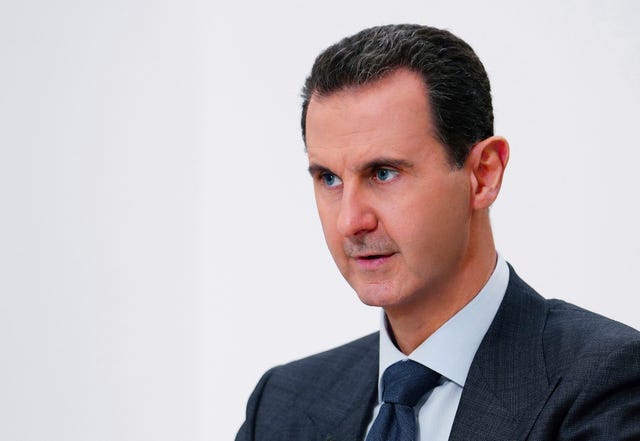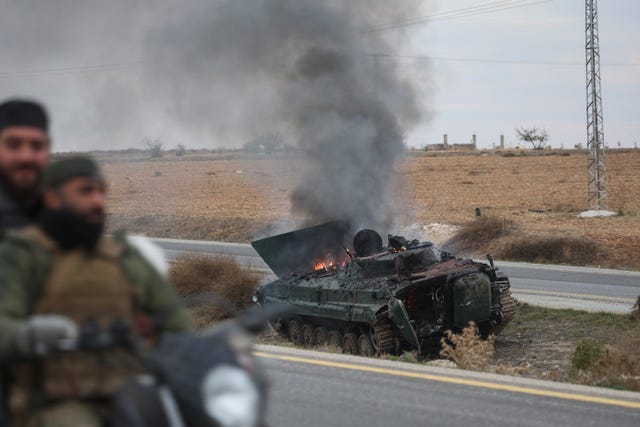Syrian government falls to lightning rebel offensive as Assad flees
It sent crowds into the streets to celebrate the end of the Assad family’s 50 years of iron rule.

The Syrian government has collapsed, falling to a lightning rebel offensive that seized control of the capital Damascus and sent crowds into the streets to celebrate the end of the Assad family’s 50 years of iron rule.
Syrian state television aired a video statement early on Sunday by a group of men saying President Bashar Assad had been overthrown and all detainees in jails had been set free.
The man who read the statement said the opposition group known as Operations Room to Conquer Damascus has called on all opposition fighters and citizens to preserve state institutions of “the free Syrian state”.
The statement emerged hours after the head of a Syrian opposition war monitor said Mr Assad had left the country for an undisclosed location, fleeing ahead of insurgents who said they had entered Damascus following a remarkably swift advance across the country.
Many of the capital’s residents were in disbelief at the speed at which Mr Assad lost his hold after nearly 14 years of civil war.
As daylight broke over Damascus, crowds gathered to pray in the city’s mosques and to celebrate in the squares, chanting “God is great”. People also chanted anti-Assad slogans and honked car horns.
Mohammed Amer Al-Oulabi, 44, who works in the electricity sector, was one of many celebrating on the streets. “From Idlib to Damascus, it only took them (the opposition forces) a few days, thank God. May God bless them, the heroic lions who made us proud,” he said.
A statement from the Alawite sect – to which Mr Assad belongs and which has formed the core of his base – called on young Syrians to be “calm, rational and prudent and not to be dragged into what tears apart the unity of our country”.
It added: “We were and still are advocates of peace and advocates of unity.” It called for “the language of reason and dialogue to prevail over all parties in the service of Syria and its great people”.
Syrian Prime Minister Mohammed Ghazi Jalali said the government is ready to “extend its hand” to the opposition and hand over its functions to a transitional government.

He later told Saudi television network Al-Arabiyya that he does not know where Mr and the defence minister are. He said he lost communication with Mr Assad late on Saturday.
Rami Abdurrahman of the Syrian Observatory for Human Rights told the Associated Press that Mr Assad took a flight early on Sunday from Damascus.
It was the first time opposition forces had reached Damascus since 2018, when Syrian troops recaptured areas on the outskirts of the capital following a years-long siege.
The night before, opposition forces took the central city of Homs, Syria’s third largest, as government forces abandoned it.
The rebels had already seized the cities of Aleppo and Hama, as well as large parts of the south, in a lightning offensive that began on November 27. Analysts said rebel control of Homs would be a game-changer.

In their push to overthrow Mr Assad’s government, the insurgents, led by the Hayat Tahrir al-Sham group, or HTS, have met little resistance from the Syrian army.
HTS already controlled much of north-west Syria and in 2017 set up a “salvation government” to run day-to-day affairs in the region.
In recent years, HTS leader Abu Mohammed al-Golani has sought to remake the group’s image, cutting ties with al-Qaeda, ditching hard-line officials and vowing to embrace pluralism and religious tolerance.
The UN’s special envoy for Syria, Geir Pedersen, called on Saturday for urgent talks in Geneva to ensure an “orderly political transition”.
The Israeli military said on Sunday it has deployed forces in a demilitarised buffer zone along its northern frontier with Syria following the rebel offensive.
The military, which said it also sent troops to “other places necessary for its defence”, said the deployment is meant to provide security for residents of the Israeli-annexed Golan Heights.





